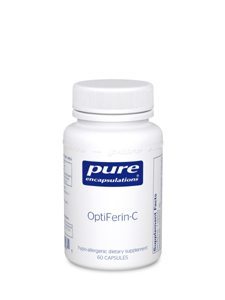 I was asked tonight by a colleague what my favorite iron supplement might be and here it is: Pure Encapsulations Optiferin-C. I love this formulation because it contains the more bioavailable form of iron, bis-glycinate as well as the Vitamin C needed for optimal absorption. More importantly, unlike the low quality, ferrous sulfate on most insurance and hospital plan formularies, the bis-glycinate form is much less likely to cause constipation.
I was asked tonight by a colleague what my favorite iron supplement might be and here it is: Pure Encapsulations Optiferin-C. I love this formulation because it contains the more bioavailable form of iron, bis-glycinate as well as the Vitamin C needed for optimal absorption. More importantly, unlike the low quality, ferrous sulfate on most insurance and hospital plan formularies, the bis-glycinate form is much less likely to cause constipation.
Iron should be taken with meals and at least 4 hours away from thyroid medications. I recommend iron, not only in cases of overt anemia, but also when ferritin levels are below 40 ng/ml and a patient is exhibiting symptoms of low iron such as fatigue, hair loss or if they have become hypothyroid. My target range for optimal ferritin levels in women is between 70 and 80 ng/ml and 100-130 ng/ml for men.
Please keep in mind that supplementing with iron is not always necessary if you are relatively asymptomatic, have borderline levels, from 20-40 ng/ml and can focus on a diet that is rich in foods containing iron, such as grass fed beef and lamb.
Though ounce for ounce, leafy greens have a tremendous amount of iron as well, it’s the heme-based iron in animal proteins that is the bioavailable form usable by the body. Thus, in vegetarians with low ferritin, supplementing may be necessary for some time, as vegetarian dietary sources tend to not work.

